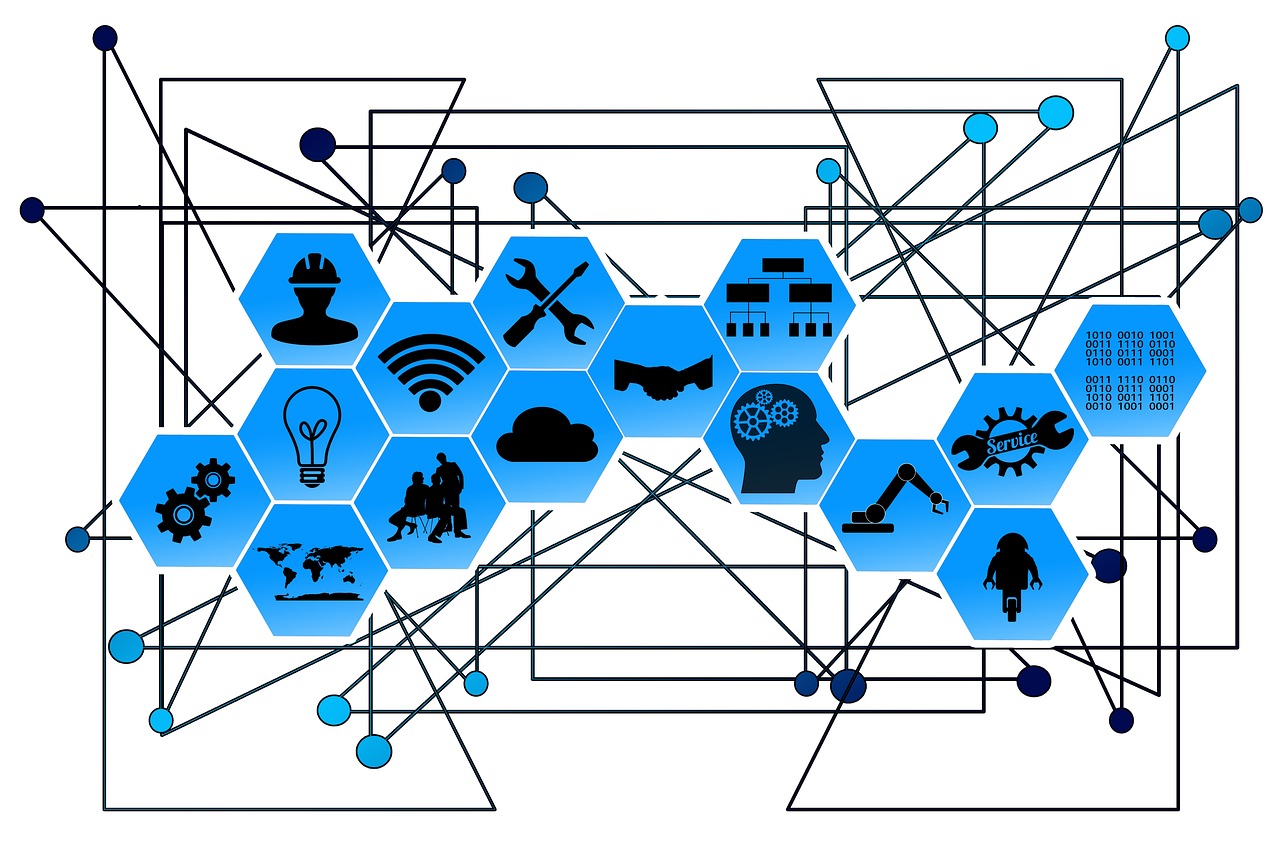How Blockchain is Enhancing Transparency in Government Contracts
In a world where trust in public institutions is waning, blockchain technology emerges as a beacon of hope, promising to revolutionize the landscape of government contracting. Imagine a system where every transaction is recorded on an immutable ledger, visible to all, and tamper-proof. This is not just wishful thinking; it's the reality that blockchain brings to the table. By leveraging this innovative technology, governments can enhance transparency, accountability, and efficiency in their contracting processes. But how exactly does this work? Let’s dive into the transformative role of blockchain in government contracts.
At its core, blockchain is a decentralized and distributed digital ledger that records transactions across many computers. This means that once a transaction is recorded, it cannot be altered without the consensus of the network. It’s akin to a public library where every book (or transaction) is cataloged, and any attempt to change a book would require the approval of all librarians. This inherent feature of blockchain provides a robust framework for increasing transparency in government contracts.
Consider the implications of this technology: by allowing all stakeholders—government officials, contractors, and the public—to access the same information in real-time, blockchain minimizes the risk of mismanagement and fraud. It acts as a transparent bridge between the government and the citizens it serves, fostering trust and confidence in public administration. With blockchain, the days of opaque dealings and hidden contracts could soon be over, paving the way for a new era of accountability.
Moreover, the integration of smart contracts—self-executing contracts with the terms directly written into code—further enhances this transparency. These contracts automatically enforce and execute terms when predefined conditions are met, eliminating the potential for human error or manipulation. It's like having a digital referee ensuring that all parties play by the rules, without bias or favoritism.
In summary, the implementation of blockchain technology in government contracts is not merely an upgrade; it’s a paradigm shift that promises to enhance transparency, reduce corruption, and ultimately restore public trust. As we explore the current issues in government contracting, the benefits of blockchain become even clearer, showcasing its potential to transform the way governments operate.
- What is blockchain technology? Blockchain is a decentralized digital ledger that records transactions across multiple computers, ensuring that the recorded information cannot be changed without consensus.
- How does blockchain enhance transparency in government contracts? By providing a public, tamper-proof record of all transactions, blockchain allows all stakeholders to access the same information, reducing the risk of fraud and mismanagement.
- What are smart contracts? Smart contracts are self-executing contracts with the terms directly written into code, which automatically enforce and execute the agreed terms when conditions are met.
- What challenges does blockchain face in government contracting? Challenges include resistance to change, technical barriers, and the need for stakeholder collaboration to ensure successful implementation.
- What is the future of blockchain in government? The future is promising, with trends pointing towards increased adoption and advancements that could significantly enhance transparency and efficiency in public sector operations.

The Basics of Blockchain Technology
Understanding blockchain technology is essential to grasp its application in government contracts. At its core, blockchain is a decentralized ledger that records transactions across multiple computers in such a way that the registered transactions cannot be altered retroactively. This means that once data is entered into the blockchain, it remains there permanently, ensuring a high level of data integrity and security. Imagine a digital ledger that is not only transparent but also immune to tampering—this is the magic of blockchain.
One of the key features of blockchain is its transparency. Every participant in the network has access to the entire blockchain, which means that any changes made to the data can be easily tracked and verified. This transparency fosters trust among stakeholders, as they can independently confirm the accuracy of the information. Additionally, the use of cryptographic techniques ensures that the data is secure, making it extremely difficult for unauthorized users to access or manipulate the information.
Another significant aspect of blockchain technology is its immutability. Once a transaction is recorded on the blockchain, it cannot be changed or deleted. This characteristic is crucial for government contracts, where maintaining a reliable and unchangeable record is vital for accountability. Think of it as a historical record that everyone can see and trust, eliminating the possibility of disputes over what was agreed upon.
Blockchain also introduces the concept of smart contracts. These are self-executing contracts with the terms of the agreement directly written into code. When predetermined conditions are met, the contract automatically executes, reducing the need for intermediaries and minimizing the chances of human error. This automation not only speeds up the contracting process but also enhances transparency, as all parties can see the contract's execution in real-time.
To summarize, the basic principles of blockchain technology can be outlined as follows:
- Decentralization: No single entity controls the entire network.
- Transparency: All transactions are visible to participants.
- Immutability: Once recorded, data cannot be altered.
- Smart Contracts: Automated contracts that execute when conditions are met.
In conclusion, blockchain technology is not just a buzzword; it represents a fundamental shift in how we think about data management and security. Its application in government contracts could revolutionize the way public funds are managed, ensuring that every dollar spent is accounted for and that the public can trust their government to act with integrity.

Current Issues in Government Contracting
Government contracting is a complex landscape riddled with challenges that can significantly undermine public trust and efficiency. One of the most pressing issues is the rampant fraud and mismanagement that can occur throughout the contracting process. When taxpayers' money is at stake, the stakes are high, and the implications of these challenges can ripple through the entire system, affecting everything from project outcomes to public perception of government integrity.
Fraudulent activities in government contracts can take many forms, including bid rigging, overbilling, and kickbacks. These practices not only drain public resources but also erode the trust citizens place in their government. The consequences are severe: when people believe that contracts are awarded based on favoritism rather than merit, it can lead to widespread cynicism and disengagement from the democratic process. How can we expect the public to support initiatives when they feel their money is being mismanaged?
Moreover, the lack of transparency in government contracting processes can create an environment ripe for corruption. Without a clear view of how contracts are awarded and managed, it becomes nearly impossible to hold anyone accountable for misdeeds. The opacity of these processes can lead to a culture of impunity, where unethical behavior goes unchecked. This raises an important question: how can we ensure that public funds are used effectively and ethically?
To illustrate the gravity of these issues, let’s take a look at some notorious cases of fraudulent contracts that have made headlines over the years. These incidents serve as cautionary tales of what can happen when transparency and accountability are not prioritized:
| Case Study | Year | Description | Impact |
|---|---|---|---|
| City of Bell Scandal | 2010 | City officials were found to have inflated salaries and mismanaged funds. | Led to significant public outrage and reforms in local government. |
| GSA Scandal | 2012 | General Services Administration employees were found to have spent lavishly on conferences. | Resulted in congressional hearings and increased scrutiny of federal spending. |
These cases highlight the urgent need for effective preventive measures against fraud. Implementing robust systems that promote transparency is essential. Blockchain technology, with its immutable ledger and decentralized nature, offers a promising solution. By making contract details publicly accessible and verifiable, blockchain can deter fraudulent practices and restore faith in government operations.
In conclusion, the current issues in government contracting—ranging from fraud to lack of transparency—pose significant challenges that must be addressed to ensure public trust and efficient resource allocation. As we explore the potential of blockchain technology, it’s crucial to recognize that the path to reform is not just about adopting new tools, but also about fostering a culture of accountability and integrity within government systems.
- What are the main issues in government contracting? The main issues include fraud, mismanagement, and lack of transparency, which can undermine public trust.
- How can blockchain help in government contracting? Blockchain can enhance transparency and accountability by providing a secure, immutable record of contracts and transactions.
- What are some examples of fraud in government contracts? Examples include bid rigging, overbilling, and kickbacks, which can lead to significant financial losses and public distrust.

Fraud and Corruption in Contracts
Fraud and corruption in government contracts are like weeds in a garden; if left unchecked, they can choke the life out of even the most robust systems. These illicit activities not only waste taxpayer money but also erode public trust in government institutions. When citizens see news stories about mismanaged funds or fraudulent contracts, it can lead to a pervasive sense of cynicism that undermines the very fabric of democracy. But what exactly constitutes fraud in government contracting, and how can we address it?
At its core, fraud in government contracts can take many forms, including:
- Bid Rigging: This occurs when contractors collude to fix prices or manipulate the bidding process, leading to inflated costs.
- False Claims: Contractors may submit invoices for work not performed or materials not delivered, effectively stealing from the public purse.
- Kickbacks: These are illicit payments made to government officials or employees to secure contracts or favorable treatment.
Each of these fraudulent activities poses significant threats to the integrity of government contracting processes. For instance, bid rigging not only inflates costs but also stifles competition, making it harder for smaller businesses to compete. Similarly, false claims can lead to subpar work, as contractors may cut corners to maximize profits, ultimately compromising the quality of public services.
To illustrate the impact of these corrupt practices, consider the case of a city that awarded a multi-million dollar contract for road construction. After the project was completed, it was discovered that the contractor had submitted false documentation, claiming to have used high-quality materials when, in reality, substandard materials were used. The roads began to crack and deteriorate within months, leading to costly repairs and a loss of public confidence in the local government.
Fortunately, blockchain technology offers a beacon of hope in combating these issues. By providing a transparent and immutable ledger, blockchain can help track every transaction related to government contracts. This means that all parties involved—from government officials to contractors—can be held accountable for their actions. Imagine a world where every contract is recorded on a blockchain, allowing for real-time audits and making it nearly impossible for fraudulent activities to go unnoticed.
In conclusion, addressing fraud and corruption in government contracts is crucial for restoring public trust and ensuring that taxpayer dollars are spent wisely. By leveraging innovative technologies like blockchain, we can create a more transparent and accountable system that benefits everyone. The journey toward a corruption-free government contracting process may be long, but with the right tools and strategies in place, it is certainly achievable.
- What are the most common types of fraud in government contracts? Common types include bid rigging, false claims, and kickbacks.
- How can blockchain help prevent fraud? Blockchain provides a transparent and immutable ledger that allows for real-time tracking and auditing of contracts.
- Why is public trust important in government contracting? Public trust is essential for effective governance and ensures that taxpayer dollars are used responsibly.

Case Studies of Fraudulent Contracts
When we talk about fraudulent contracts in the realm of government, it’s not just about numbers on a page; it’s about the trust that gets shattered and the public resources that get mismanaged. One of the most notorious cases is the Boston Big Dig, a massive infrastructure project that spiraled out of control. Originally budgeted at $2.8 billion, it ballooned to over $22 billion. This project faced numerous allegations of fraud, including inflated contractor bills and shoddy workmanship. The public outcry was deafening, as taxpayers felt the sting of mismanagement and deceit.
Another glaring example is the FEMA trailer scandal after Hurricane Katrina. Thousands of trailers were purchased for displaced residents, but many were found to be overcharged and poorly constructed. Investigations revealed that some contractors colluded to inflate prices, leading to a loss of millions in taxpayer dollars. These cases are not isolated incidents; they highlight a systemic problem that can erode public trust in government operations.
To understand the implications of these fraud cases, let’s take a look at a table summarizing key details:
| Case Study | Issue | Financial Impact | Outcome |
|---|---|---|---|
| Boston Big Dig | Cost Overruns, Fraudulent Billing | $22 billion | Public Outrage, Legal Actions |
| FEMA Trailer Scandal | Inflated Prices, Poor Quality | Millions Lost | Investigations, Reforms Proposed |
These examples illustrate how fraud in government contracts can lead to significant financial losses and erode public trust. The damage isn’t just monetary; it creates a ripple effect that affects the entire community. People start to question the integrity of their government and the efficacy of public spending.
In light of these cases, it’s clear that implementing a solution like blockchain could have made a significant difference. With its transparent and immutable ledger, blockchain could have provided a clear trail of transactions, making it much harder for fraudulent activities to go unnoticed. Imagine a world where every contract is recorded on a blockchain, and each transaction is visible to the public. This level of transparency could deter fraudsters and restore faith in government operations.
In summary, the case studies of fraudulent contracts serve as a stark reminder of the vulnerabilities within government contracting. They not only highlight the urgent need for reform but also underscore the potential of technologies like blockchain to enhance transparency and accountability.
- What is blockchain technology? Blockchain is a decentralized digital ledger that records transactions across many computers securely and transparently.
- How can blockchain prevent fraud in government contracts? By providing an immutable record of transactions, blockchain makes it difficult for fraudulent activities to be hidden or altered.
- What are smart contracts? Smart contracts are self-executing contracts with the terms of the agreement directly written into code, automating and enforcing contract terms without human intervention.
- Are there any challenges in implementing blockchain in government? Yes, challenges include resistance to change, technical barriers, and the need for stakeholder collaboration.

Preventive Measures Against Fraud
In the realm of government contracting, fraud prevention is not just a necessity; it’s a mandate. The stakes are high, and the consequences of fraudulent activities can ripple through the fabric of public trust and resource allocation. So, how can we effectively combat fraud? Enter blockchain technology, a game-changer that offers a suite of preventive measures designed to safeguard against corruption.
At its core, blockchain operates on an immutable ledger, meaning once data is recorded, it cannot be altered or deleted. This feature alone acts as a powerful deterrent against fraudulent activities. Imagine a digital ledger that everyone can see, but no one can tamper with. It’s like having a transparent glass safe where every transaction is visible, and any attempt to manipulate the data is instantly flagged. This transparency ensures that all stakeholders can verify the integrity of contracts, making it significantly harder for corrupt practices to thrive.
Moreover, the use of smart contracts within blockchain frameworks automates the execution of contract terms. This automation reduces the potential for human error and manipulation, as the terms are executed exactly as programmed. Think of it as having a trusted robot that follows the rules without deviation. If a contractor fails to meet their obligations, the smart contract can automatically trigger penalties or even terminate the agreement, all without human intervention. This not only streamlines the process but also reinforces accountability.
To further enhance fraud prevention, implementing a multi-signature authorization process can be beneficial. This means that multiple parties must approve any changes or transactions within the blockchain system. For example, in a government contract, both the contracting authority and the contractor could be required to sign off on any amendments. This dual control creates a system of checks and balances that significantly reduces the risk of fraud.
Additionally, regular audits and monitoring of blockchain transactions can help identify any irregularities early on. By employing advanced analytics tools, stakeholders can track patterns and flag suspicious activities in real-time. This proactive approach allows for immediate corrective actions, preventing minor issues from escalating into major scandals. It’s akin to having a security camera that not only records but also alerts you when something seems off.
In conclusion, while no system is foolproof, the integration of blockchain technology in government contracts provides a robust framework for fraud prevention. By leveraging its immutable ledger, smart contracts, multi-signature processes, and continuous monitoring, we can create a more transparent and accountable contracting environment. The goal is clear: to build a system where trust is not just expected but guaranteed.
- What is blockchain technology? Blockchain is a decentralized digital ledger that records transactions across many computers securely and transparently.
- How does blockchain prevent fraud? Its immutable nature ensures that once information is recorded, it cannot be altered, making fraudulent activities easily detectable.
- What are smart contracts? Smart contracts are self-executing contracts with the terms directly written into code, automating and enforcing contract terms without human intervention.
- Can blockchain be integrated into existing systems? Yes, with careful planning and collaboration among stakeholders, blockchain can be effectively integrated into current government contracting systems.

The Role of Smart Contracts
Smart contracts are revolutionizing the way government contracts are executed and managed. Imagine a world where contracts are not just pieces of paper, but rather self-executing codes that live on a blockchain, ensuring that all parties adhere to the agreed-upon terms without the need for intermediaries. This technology operates on the principle of trustless transactions, meaning that parties do not need to trust each other; they only need to trust the code. By automating processes and enforcing contract terms, smart contracts significantly reduce the chances of human error and manipulation.
How do smart contracts actually work? At their core, they are programmed to execute actions when certain conditions are met. For example, consider a scenario where a government agency contracts a construction firm to build a bridge. The smart contract could be programmed to release payments automatically based on specific milestones, such as the completion of the foundation or the final inspection. This not only ensures timely payments but also keeps all stakeholders informed about the project’s progress, enhancing transparency.
Furthermore, smart contracts can incorporate various features that bolster accountability and compliance. Here are some key aspects:
- Transparency: All transactions are recorded on the blockchain, allowing anyone to verify the contract's execution.
- Immutability: Once a smart contract is deployed, it cannot be altered, which protects against unauthorized changes.
- Efficiency: By automating processes, smart contracts eliminate the need for manual intervention, speeding up execution times.
In addition to these benefits, smart contracts can also facilitate complex agreements that involve multiple parties. For instance, in public procurement, a smart contract can manage the interactions between various stakeholders, such as suppliers, contractors, and government officials, ensuring that everyone adheres to the agreed terms. This interconnectedness not only streamlines workflows but also helps in maintaining a clear audit trail, which is essential for accountability.
However, while the potential of smart contracts is immense, their implementation in government contracts is not without challenges. Issues such as technical literacy, regulatory frameworks, and public acceptance need to be addressed to fully realize their benefits. As governments begin to embrace blockchain technology, it is crucial to foster an environment where smart contracts can thrive, ensuring that they enhance transparency and trust in public administration.
What are smart contracts?
Smart contracts are self-executing contracts with the terms of the agreement directly written into code, allowing for automated execution and enforcement.
How do smart contracts enhance transparency?
They operate on a blockchain, where all transaction data is recorded, making it publicly accessible and verifiable, thus increasing transparency.
Are smart contracts secure?
Yes, smart contracts are secure due to the immutable nature of blockchain technology, which protects them from unauthorized alterations.
What challenges do smart contracts face in government?
Challenges include technical literacy among stakeholders, the need for regulatory frameworks, and overcoming resistance to change.

Benefits of Blockchain in Government Contracts
Implementing blockchain technology in government contracts is like adding a turbocharger to a car—it significantly enhances performance and efficiency. The benefits of this revolutionary technology extend far beyond mere convenience; they fundamentally reshape how government transactions are conducted. From increased transparency to enhanced security, the advantages of blockchain are compelling and necessary for modern governance.
One of the most notable benefits is the increased efficiency it brings to the contracting process. Traditional methods often involve cumbersome paperwork, lengthy approval processes, and multiple intermediaries. With blockchain, all parties involved can access a single, immutable ledger that records every transaction in real-time. This means that contracts can be executed faster, reducing the time it takes to deliver essential services to the public. Imagine a world where government projects are completed ahead of schedule—this is not just a dream but a tangible outcome of blockchain integration.
Moreover, blockchain enhances security and data integrity. In an era where data breaches and cyber threats are rampant, protecting sensitive information is paramount. Blockchain’s decentralized nature means that data is not stored in a single location, making it far more resistant to hacking attempts. Each transaction is encrypted and linked to the previous one, creating a chain that is virtually impossible to alter without detection. This level of security is crucial for maintaining the trust of the public in government operations.
Another significant benefit is the improved accountability that blockchain provides. Every action taken within the blockchain is recorded and can be traced back to the responsible party. This transparency not only deters fraudulent activities but also encourages ethical behavior among contractors and government officials. Imagine a scenario where every contract is publicly accessible, allowing citizens to see how their tax dollars are being spent. This level of oversight can lead to a more engaged and informed public, fostering a culture of trust and responsibility.
Additionally, blockchain technology can facilitate smart contracts, which automate and enforce contractual obligations without the need for intermediaries. These self-executing contracts ensure that all parties fulfill their obligations as per the agreed terms, thereby reducing the risk of disputes and enhancing compliance. For example, if a contractor fails to meet a deadline, the smart contract can automatically trigger penalties or adjustments, ensuring that accountability is maintained.
In summary, the integration of blockchain technology into government contracts offers a plethora of benefits, including:
- Increased efficiency by streamlining processes.
- Enhanced security to protect sensitive data.
- Improved accountability through transparent record-keeping.
- Automation of processes via smart contracts.
As we move towards a more digital future, the need for transparent, efficient, and secure government contracting processes will only grow. Blockchain technology stands at the forefront of this transformation, ready to tackle the challenges of today and tomorrow.
Q1: How does blockchain improve transparency in government contracts?
A1: Blockchain provides a public ledger that records all transactions, making it easy for stakeholders and the public to verify contract details and execution.
Q2: What are smart contracts?
A2: Smart contracts are self-executing contracts with the terms of the agreement directly written into code. They automatically enforce and execute contract terms when conditions are met.
Q3: Are there any downsides to implementing blockchain in government contracts?
A3: While blockchain offers many benefits, challenges include the need for technical expertise, potential resistance to change, and the initial cost of implementation.
Q4: How can blockchain reduce fraud in government contracting?
A4: By providing an immutable and transparent record of all transactions, blockchain makes it extremely difficult to manipulate or alter contract details, thereby reducing opportunities for fraud.

Increased Efficiency and Speed
When we talk about efficiency in government contracts, it’s not just about getting things done faster; it's about doing them better. Imagine a world where bureaucratic red tape is cut down to size, where processes that once took weeks or even months can be completed in mere days. This is the kind of transformation blockchain technology brings to the table. By utilizing a decentralized ledger, blockchain enables real-time updates and transparency, which significantly reduces the time spent on contract management.
One of the standout features of blockchain is its ability to streamline the entire contracting process. For instance, with traditional systems, multiple parties often have to verify documents and approvals, leading to delays. However, with blockchain, all stakeholders can access the same information simultaneously. This not only speeds up the process but also minimizes the chances of errors and miscommunication. Think of it like a relay race where each runner is waiting for their turn to receive the baton; blockchain allows everyone to run at the same time, making the race much quicker.
Moreover, the automation of processes through smart contracts plays a pivotal role in enhancing efficiency. These digital contracts execute automatically when predetermined conditions are met, eliminating the need for manual intervention. For example, if a contractor completes a project milestone, the payment can be released instantly without waiting for approvals. This not only accelerates financial transactions but also builds trust among parties involved, as everyone knows that the terms are being enforced without bias.
To give you a clearer picture, let's look at a hypothetical scenario:
| Traditional Contracting Process | Blockchain Contracting Process |
|---|---|
| Multiple approvals needed | Automated approvals through smart contracts |
| Weeks to process documentation | Real-time updates and processing |
| High potential for errors | Reduced errors through transparency |
| Trust issues among parties | Increased trust through immutable records |
This comparison highlights how blockchain can drastically cut down the time and resources required in government contracting. When processes are streamlined, not only do projects get completed faster, but they also become more cost-effective. This means taxpayer money is spent more wisely, and public services can be delivered in a timely manner, ultimately leading to greater satisfaction among citizens.
In conclusion, the integration of blockchain technology in government contracts holds the promise of enhanced efficiency and speed. As we continue to explore this innovative technology, it becomes increasingly clear that it can revolutionize the way government transactions are conducted, paving the way for a more responsive and accountable public sector.
- What is blockchain technology? Blockchain is a decentralized digital ledger that records transactions across many computers in a way that the registered transactions cannot be altered retroactively.
- How do smart contracts work? Smart contracts are self-executing contracts with the terms of the agreement directly written into code, enabling automatic enforcement of contract conditions.
- What are the benefits of using blockchain in government contracts? Benefits include increased efficiency, enhanced security, improved transparency, and reduced fraud.
- Are there challenges in adopting blockchain technology? Yes, challenges include resistance to change, technical barriers, and the need for stakeholder collaboration.

Enhanced Security and Data Integrity
In the realm of government contracts, security and data integrity are paramount. Imagine a world where sensitive information is protected like a fortress, immune to unauthorized access and tampering. That's the promise of blockchain technology. By utilizing an immutable ledger, blockchain ensures that once data is recorded, it cannot be altered or deleted without consensus from the network. This feature is akin to having a digital notary that verifies every transaction, providing a level of trust that traditional systems simply cannot match.
The decentralized nature of blockchain means that data is not stored in a single location, which significantly reduces the risk of hacking. Instead of having a central database that can be targeted, information is distributed across a network of computers, making it nearly impossible for malicious actors to alter the data without being detected. This is particularly crucial for government contracts, where the stakes are high, and the potential for fraud and manipulation can lead to significant financial losses and erosion of public trust.
Furthermore, blockchain employs advanced cryptographic techniques to secure data. Each transaction is encrypted and linked to the previous one, creating a chain that is both secure and transparent. This transparency allows stakeholders to verify transactions in real-time, ensuring that all parties are held accountable. For instance, if a contractor submits a bid for a project, the details can be recorded on the blockchain, allowing for immediate verification by government officials and the public alike. This level of transparency not only deters fraudulent activities but also fosters a culture of accountability.
To illustrate the impact of blockchain on security and data integrity, consider the following table that outlines the key differences between traditional contract management systems and blockchain-based systems:
| Feature | Traditional Systems | Blockchain Systems |
|---|---|---|
| Data Storage | Centralized | Decentralized |
| Data Modification | Possible | Immutable |
| Transaction Verification | Manual | Automated |
| Access Control | Vulnerable to Hacks | Highly Secure |
In summary, the adoption of blockchain technology in government contracts not only enhances security but also ensures the integrity of data. As we move towards a more digital future, the need for secure, transparent, and reliable systems will only grow. Blockchain stands at the forefront of this evolution, ready to revolutionize how government contracts are managed and executed.
- What is blockchain technology? Blockchain is a decentralized digital ledger that records transactions across many computers, ensuring that the recorded information cannot be altered retroactively.
- How does blockchain enhance security? By decentralizing data storage and employing cryptographic techniques, blockchain significantly reduces the risk of unauthorized access and data tampering.
- Can blockchain prevent fraud in government contracts? Yes, the transparency and immutability of blockchain transactions make it difficult for fraudulent activities to go unnoticed, thereby enhancing public trust.
- What are smart contracts? Smart contracts are self-executing contracts with the terms of the agreement directly written into code, allowing for automatic enforcement and reducing the potential for human error.

Implementing Blockchain Solutions
Implementing blockchain solutions in government contracts is not just a technical upgrade; it’s a paradigm shift that requires careful thought and strategic planning. The transition to blockchain technology can feel like trying to teach an old dog new tricks. It demands a cohesive approach that brings together various stakeholders, including government officials, contractors, and the public. But how do we make this shift seamless and effective? The answer lies in understanding the steps necessary for successful integration.
First and foremost, it’s crucial to establish a clear roadmap. This roadmap should outline the specific goals of implementing blockchain—whether it’s enhancing transparency, reducing fraud, or improving efficiency. By having a defined objective, all parties involved can align their efforts towards a common purpose. Just like a ship needs a captain to navigate through stormy waters, a well-defined strategy will guide the implementation process through potential challenges and uncertainties.
Next, stakeholder collaboration plays a pivotal role in the success of blockchain integration. Engaging all relevant parties early in the process can foster a sense of ownership and commitment. This collaboration can take various forms, including workshops, meetings, and feedback sessions. It’s essential to listen to the concerns and suggestions of all stakeholders, as their insights can provide valuable perspectives that might not be immediately apparent. After all, implementing a new technology is akin to building a bridge; you need the input of engineers, architects, and even the community to ensure it stands the test of time.
Moreover, education and training are vital components of this transition. Many stakeholders may be unfamiliar with blockchain technology and its benefits. Providing comprehensive training sessions can demystify the technology and showcase its advantages. Think of it as a cooking class; if you want people to enjoy a new dish, you need to show them how to prepare it first. By empowering stakeholders with knowledge, you not only facilitate smoother implementation but also build confidence in using the new system.
However, despite its potential, the adoption of blockchain technology is not without challenges. Resistance to change is one of the most significant hurdles. Many individuals may be comfortable with existing systems and wary of new technologies. To combat this resistance, it’s crucial to communicate the benefits of blockchain clearly. Demonstrating how it can simplify processes, enhance transparency, and ultimately serve the public better can help alleviate fears and encourage acceptance.
Additionally, technical barriers can present obstacles during implementation. Issues such as integration with existing systems, data migration, and cybersecurity must be addressed. A thorough assessment of current infrastructure will help identify potential gaps and areas for improvement. This assessment can be visualized in a table format:
| Challenge | Potential Solution |
|---|---|
| Resistance to Change | Clear Communication of Benefits |
| Technical Integration | Thorough Infrastructure Assessment |
| Data Migration Issues | Strategic Planning and Testing |
| Cybersecurity Concerns | Enhanced Security Protocols |
Finally, it’s important to establish metrics for success. How will we know if the implementation is effective? Setting clear Key Performance Indicators (KPIs) can help measure the impact of blockchain on government contracts. These could include metrics related to efficiency, fraud reduction, and stakeholder satisfaction. Think of KPIs as the compass guiding your ship; they help you stay on course and adjust your strategy as needed.
In summary, implementing blockchain solutions in government contracts is a multifaceted endeavor that requires careful planning, collaboration, and education. By addressing challenges head-on and fostering a culture of openness and innovation, governments can harness the power of blockchain to create a more transparent and accountable contracting process.
- What is blockchain technology? Blockchain is a decentralized digital ledger that records transactions across many computers so that the recorded transactions cannot be altered retroactively.
- How does blockchain enhance transparency? By providing an immutable and transparent record of transactions, blockchain allows all parties to verify and audit contract activities in real-time.
- What are smart contracts? Smart contracts are self-executing contracts with the terms directly written into code, which automatically enforce and execute contractual agreements when conditions are met.
- What challenges might arise when implementing blockchain? Challenges include resistance to change, integration with existing systems, and the need for robust cybersecurity measures.

Stakeholder Collaboration and Buy-in
When it comes to implementing blockchain solutions in government contracts, one of the most critical factors for success is . This isn’t just about getting a few signatures on a proposal; it’s about creating a culture of trust and openness among all parties involved. Imagine trying to build a house without the cooperation of the architect, the builders, and the suppliers. It just wouldn’t work! The same principle applies here. Without the support of key stakeholders—government officials, contractors, and the public—any blockchain initiative is likely to flounder.
To foster collaboration, it’s essential to communicate the benefits of blockchain clearly. Stakeholders need to understand how this technology can enhance transparency, reduce fraud, and streamline processes. For instance, imagine a world where every transaction related to government contracts is recorded on an immutable ledger. This not only increases accountability but also allows for real-time tracking of funds and resources. By presenting these advantages in relatable terms, stakeholders are more likely to see the value in adopting blockchain.
Moreover, holding workshops and seminars can be an effective way to engage stakeholders. These events provide a platform for discussion, allowing participants to voice their concerns and ask questions. This two-way communication is vital for building trust. After all, if stakeholders feel heard and valued, they are more likely to support the initiative. Additionally, bringing in experts who can share success stories from other sectors can help to alleviate fears and misconceptions about blockchain technology.
Another vital aspect of gaining stakeholder buy-in is addressing any potential resistance to change. Change can be daunting, especially in a field as traditional as government contracting. It’s important to acknowledge these fears and provide reassurances. For example, stakeholders might worry about the complexity of blockchain technology or the costs associated with its implementation. By presenting a clear roadmap that outlines the steps for integration and showcasing potential return on investment, you can help to mitigate these concerns.
Ultimately, the goal is to create a sense of ownership among stakeholders. When they feel like they are part of the process, they are more likely to champion the initiative within their circles. This grassroots support can be invaluable in overcoming bureaucratic hurdles and ensuring a smoother implementation process. In essence, collaboration and buy-in are not just nice-to-haves; they are essential components of a successful blockchain strategy in government contracting.
- What is blockchain technology? Blockchain is a decentralized digital ledger that records transactions across many computers in a way that the registered information cannot be altered retroactively.
- How can blockchain enhance transparency in government contracts? By providing an immutable record of all transactions, blockchain ensures that all parties can verify the authenticity and integrity of contract-related data.
- What are smart contracts? Smart contracts are self-executing contracts with the terms of the agreement directly written into code, which automatically enforce and execute the contract when conditions are met.
- What challenges might arise in implementing blockchain? Challenges include resistance to change, technical barriers, and the need for stakeholder education and engagement.
- How can I get involved in blockchain initiatives in government? You can start by attending local workshops, engaging with government representatives, or joining organizations focused on blockchain technology.

Challenges in Adoption
Adopting blockchain technology in government contracts is not a walk in the park. While the potential benefits are significant, several challenges can hinder successful implementation. One major hurdle is resistance to change. Government agencies and officials often operate within established frameworks, and introducing a new technology can be met with skepticism. People are inherently comfortable with the status quo, and when faced with the prospect of learning and adapting to a new system, there can be a significant pushback.
Another challenge is the technical barriers associated with blockchain technology. Many government agencies may lack the necessary technical expertise or resources to implement blockchain solutions effectively. This can lead to a situation where organizations are aware of the advantages of blockchain but feel overwhelmed by the complexity of its integration into their existing systems. Additionally, the infrastructure required for blockchain can be costly, and budget constraints often limit the ability to invest in new technologies.
Furthermore, there are regulatory and legal considerations that come into play when implementing blockchain in government contracts. Laws and regulations surrounding data privacy and security must be carefully navigated to ensure compliance. The legal frameworks governing contracts may also need to evolve to accommodate the unique characteristics of blockchain technology, which can be a slow and cumbersome process.
Lastly, the need for stakeholder collaboration cannot be overstated. Successful adoption of blockchain requires buy-in from various parties, including government officials, contractors, and the public. Without a unified vision and support from all stakeholders, the chances of successful implementation diminish significantly. Engaging these stakeholders in meaningful discussions about the benefits and implications of blockchain is crucial for overcoming resistance and fostering an environment conducive to change.
In summary, while the adoption of blockchain in government contracts holds great promise, it is essential to address the challenges of resistance to change, technical barriers, regulatory considerations, and the need for stakeholder collaboration. By understanding these challenges, government entities can better prepare for a smoother transition to blockchain technology.
- What is blockchain technology? Blockchain is a decentralized digital ledger that records transactions across many computers securely and transparently.
- How can blockchain improve government contracts? Blockchain enhances transparency, accountability, and efficiency, reducing the risk of fraud and mismanagement.
- What are smart contracts? Smart contracts are self-executing contracts with the terms of the agreement directly written into code, automatically enforcing and executing contract terms.
- What challenges does blockchain face in government adoption? Challenges include resistance to change, technical barriers, regulatory considerations, and the need for stakeholder collaboration.

Future Prospects of Blockchain in Government
The future of blockchain technology in government contracting is not just a fleeting trend; it’s a transformative force that promises to reshape how public sector operations function. As we look ahead, the integration of blockchain can significantly enhance transparency, accountability, and efficiency in government contracts. Imagine a world where every transaction is recorded in an immutable ledger, making it nearly impossible to manipulate records. This is the potential of blockchain, and it’s closer than we think.
Emerging trends indicate that more governments are beginning to recognize the value of blockchain. Countries like Estonia and Dubai are already leading the charge by implementing blockchain solutions across various public services. These early adopters serve as beacons of innovation, demonstrating that blockchain can streamline processes, reduce costs, and ultimately improve citizen engagement. As more governments observe these successes, we can expect a ripple effect, encouraging others to follow suit.
One of the most exciting prospects is the development of interoperable blockchain systems. This means that different governmental departments can share data seamlessly, enhancing collaboration and efficiency. Imagine a scenario where the procurement department, finance department, and project management teams can access real-time data on contracts. This level of transparency will not only reduce the chances of fraud but also foster a culture of trust among stakeholders.
Additionally, the rise of artificial intelligence (AI) in conjunction with blockchain can further revolutionize government contracting. AI can analyze vast amounts of data to identify patterns and anomalies, flagging potential issues before they escalate. When combined with blockchain’s secure and transparent nature, this creates a robust defense against fraud and mismanagement.
However, it’s essential to acknowledge that the journey towards widespread blockchain adoption in government will not be without challenges. Resistance to change and the need for significant investment in technology and training remain significant hurdles. Yet, the long-term benefits far outweigh these initial obstacles. As more governments invest in education and infrastructure, the transition will become smoother.
In conclusion, the future of blockchain in government contracting is bright. With its potential to enhance transparency, improve efficiency, and reduce corruption, it is poised to become a standard practice in public administration. As we move forward, the collaboration between technology providers and government entities will be crucial in realizing this vision. The question isn’t whether blockchain will change government contracting; it’s when and how effectively it will do so.
- What is blockchain technology? Blockchain is a decentralized digital ledger that records transactions across multiple computers securely and transparently.
- How can blockchain reduce fraud in government contracts? By providing an immutable record of transactions, blockchain makes it difficult to alter or manipulate contract data, thereby reducing opportunities for fraud.
- What are smart contracts? Smart contracts are self-executing contracts with the terms of the agreement directly written into code, enabling automated and secure transactions.
- What challenges does blockchain face in government adoption? Challenges include resistance to change, the need for significant investment in technology, and the necessity for training personnel.
- Can blockchain improve citizen engagement? Yes, by enhancing transparency and allowing citizens to track government spending and contracts, blockchain can foster greater trust and engagement.
Frequently Asked Questions
- What is blockchain technology?
Blockchain technology is a decentralized digital ledger that records transactions across many computers in a way that the registered transactions cannot be altered retroactively. This ensures transparency and security, making it a game-changer for various sectors, including government contracts.
- How does blockchain enhance transparency in government contracts?
By utilizing an immutable ledger, blockchain allows all parties involved in a government contract to view and verify transactions in real-time. This transparency helps reduce fraud and corruption, ensuring public trust in how taxpayer money is spent.
- What are smart contracts and how do they work?
Smart contracts are self-executing contracts with the terms of the agreement directly written into code. They automatically enforce and execute the terms when predefined conditions are met, minimizing human error and manipulation, thus enhancing overall transparency.
- What challenges does blockchain face in government contracting?
Despite its advantages, blockchain faces challenges such as resistance to change among stakeholders, technical barriers, and the need for substantial initial investment in technology and training. Addressing these challenges is crucial for successful adoption.
- Can blockchain completely eliminate fraud in government contracts?
While blockchain significantly reduces the risk of fraud through its transparent and immutable nature, it cannot completely eliminate it. Continuous monitoring, effective governance, and stakeholder engagement are essential to further mitigate risks.
- What are the benefits of implementing blockchain in government contracts?
Implementing blockchain can lead to increased efficiency, enhanced security, improved accountability, and faster project completions. These benefits contribute to better service delivery and greater public trust in government operations.
- How can stakeholders be engaged in the implementation of blockchain?
Engaging stakeholders involves clear communication about the benefits of blockchain, addressing concerns, and actively involving them in the planning and implementation process. Building trust and collaboration is key to successful adoption.
- What is the future of blockchain in government?
The future of blockchain in government looks promising, with potential advancements in technology and increasing acceptance among stakeholders. As more governments recognize its benefits, we can expect broader implementation, leading to more transparent and accountable public services.



















